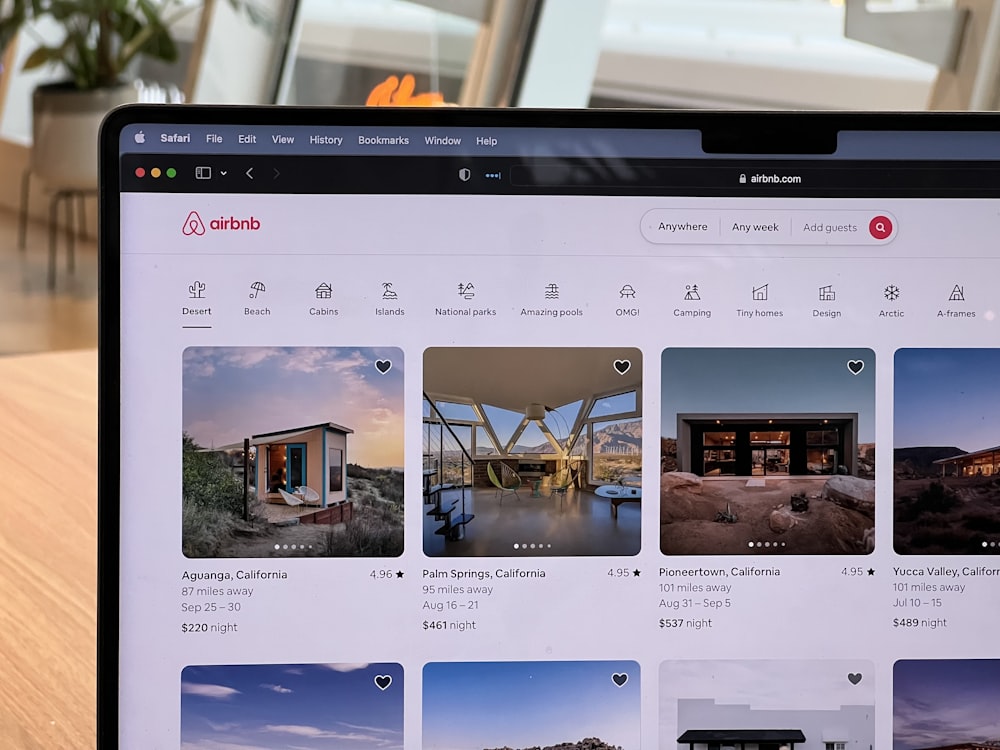In the digital age, the hospitality industry has been revolutionized by platforms like Airbnb. Launched in 2008, Airbnb has grown exponentially, becoming a major player in the global travel and tourism sector. This article provides an in-depth analysis of Airbnb statistics, highlighting its growth, user demographics, host information, revenue, and more.
Airbnb’s Journey and Growth
Airbnb’s story begins in 2007 when Brian Chesky and Joe Gebbia transformed their San Francisco apartment into a makeshift bed-and-breakfast for conference attendees. This innovative concept laid the foundation for what would become one of the most revolutionary platforms in the travel industry. From offering air mattresses to now providing a wide array of lodging options, Airbnb’s journey is a testament to innovation, community, and the sharing economy.
Over the years, Airbnb has witnessed exponential growth. The platform now operates in over 220 countries and regions, making it a truly global entity. Its offerings have evolved beyond simple accommodations to include Airbnb Experiences, allowing travelers to enjoy unique activities hosted by locals. This expansion enhances the travel experience, providing more than just a place to stay but a way to immerse oneself in the local culture.
As of 2023, Airbnb has dramatically increased its listings to over 7.7 million worldwide, showcasing a diverse range of properties from apartments and houses to castles and treehouses. This diversity caters to a broad spectrum of traveler preferences, ensuring there’s something for everyone. The platform is supported by four million hosts who open their homes and share their communities with travelers from around the globe.
The growth of Airbnb also reflects changing consumer behaviors and preferences, with more travelers seeking authentic, local experiences over traditional hotel stays. The company’s success is indicative of the rising trend towards more personalized and flexible travel arrangements.
Furthermore, Airbnb’s impact extends beyond travel and tourism. It has influenced real estate markets, local economies, and even regulatory frameworks in cities worldwide. As Airbnb continues to grow, it not only shapes the way we travel but also how cities adapt to new tourism models.
Airbnb’s journey from a simple idea to a global phenomenon underscores the power of innovation and community in creating new market opportunities. The platform’s continued growth and adaptation in response to traveler needs and market trends suggest that Airbnb will remain at the forefront of the travel industry for years to come. This remarkable growth trajectory highlights Airbnb’s role not just as a company, but as a cultural shift in how we explore the world.
Revenue Generation
Airbnb’s financial journey has been marked by significant milestones, with revenue growth standing out as a key indicator of its success and market penetration. In 2023, Airbnb reported an impressive year-on-year revenue increase of 19.2%, reaching a remarkable $9.9 billion. This growth is reflective of an increasing consumer shift towards alternative accommodation options, with a noticeable preference among millennial travelers who seek unique and authentic experiences.
The surge in revenue is not merely a testament to Airbnb’s expanding market presence but also highlights the effectiveness and sustainability of its business model. The platform has succeeded in creating a seamless connection between hosts looking to monetize their spaces and travelers seeking non-traditional lodging. This symbiotic relationship has fueled Airbnb’s growth, enabling it to capture a significant share of the global travel market.
Several factors contribute to Airbnb’s revenue generation. Firstly, the platform’s user-friendly interface simplifies the booking process, making it accessible to a broad user base. This ease of use encourages repeat business and word-of-mouth referrals, driving more traffic to the site. Additionally, Airbnb’s diverse range of listings caters to various preferences and budgets, from urban apartments to secluded cabins, ensuring that there is something for every traveler.
Moreover, Airbnb’s commitment to providing unique travel experiences extends beyond just accommodations. The introduction of Airbnb Experiences, which allows travelers to book local tours, workshops, and activities, has opened new revenue streams for the company. This expansion into experiential travel aligns with current tourism trends and enhances guests’ overall travel experience, contributing further to Airbnb’s revenue.
The platform’s pricing strategy also plays a significant role in its revenue growth. By allowing hosts to set their prices while providing pricing recommendations based on market data, Airbnb ensures competitive rates that appeal to a wide audience. Additionally, the company’s commission-based revenue model, where it takes a percentage from each booking, aligns Airbnb’s interests with those of its hosts, fostering a partnership that drives mutual financial success.
In conclusion, Airbnb’s impressive revenue growth is a direct result of its innovative approach to travel, commitment to user experience, and adaptability to market trends. As the platform continues to evolve and expand its offerings, its revenue generation capabilities are likely to increase, further cementing Airbnb’s position as a leader in the global travel industry.
Profit Margins
The financial health of a company is often measured by its profit margins, and in the case of Airbnb, these figures are particularly telling of its robust position in the market. In 2023, Airbnb reported a net income of $4.7 billion, an achievement that underscores the platform’s ability to not only generate revenue but also translate it into actual profit. This marks the second consecutive year that Airbnb has remained profitable, a significant indicator of the company’s enduring financial performance and resilience amidst a competitive and ever-changing market landscape.
Airbnb’s notable profit margins can be attributed to several key factors. First and foremost is the platform’s scalable business model. Unlike traditional hospitality businesses that require significant capital investments in property and infrastructure, Airbnb operates with relatively lower overhead costs. This lean operational model allows a larger portion of the revenue to be retained as profit.
Efficiency and cost-effective strategies have also played crucial roles in enhancing Airbnb’s profit margins. The company has continually optimized its operations and marketing expenditures to ensure maximum return on investment. By leveraging data analytics and machine learning, Airbnb has been able to personalize user experiences, target effective marketing campaigns, and streamline operations, further reducing costs and boosting profits.
Additionally, Airbnb’s diverse global market presence has provided it with multiple streams of income, cushioning it against regional market fluctuations and seasonal variances. This geographical diversification helps maintain a steady flow of revenue, contributing to the company’s overall profitability.
Another contributing factor is Airbnb’s pricing flexibility. The platform’s dynamic pricing model allows hosts to adjust rates based on demand, seasonality, and other factors, ensuring optimal occupancy rates and revenue per booking. This flexibility not only benefits the hosts but also contributes to Airbnb’s profit margins by maximizing earnings from commissions and service fees.
The company’s continuous innovation and expansion into new markets and services, such as Airbnb Experiences and luxury rentals, have opened additional revenue channels. These initiatives not only enhance the customer experience but also contribute to higher average transaction values, further boosting profitability.
In conclusion, Airbnb’s impressive profit margins are a testament to the effectiveness of its business model and operational strategies. The company’s ability to maintain profitability while growing revenue speaks to its financial health and positions it well for future growth and sustainability. As Airbnb continues to innovate and adapt to market trends, its profit margins will remain a key indicator of its success and financial robustness.
Gross Booking Value
Airbnb’s Gross Booking Value (GBV) serves as a comprehensive metric, encapsulating the total economic activity generated through the platform. In 2023, Airbnb’s GBV experienced a significant uplift, reaching $73.3 billion, marking a 15.9% increase from the previous year. This figure reflects the total value of all bookings made via Airbnb, inclusive of accommodation rates, cleaning fees, service charges, and any additional fees associated with the reservations.
The increase in GBV is a direct indicator of heightened demand for Airbnb’s services. Several factors contribute to this surge. Firstly, there’s a growing consumer preference for unique lodging options over traditional hotels, driven by desires for personalized and immersive travel experiences. Airbnb’s vast and varied inventory caters precisely to this trend, offering everything from city apartments to remote cottages, thereby attracting a wide range of travelers.
Moreover, the rise in GBV can also be attributed to the platform’s global expansion and increased penetration in existing markets. As Airbnb continues to grow its host community and listing portfolio, it becomes accessible to more travelers, further driving bookings and, consequently, GBV.
Seasonal spikes and travel trends also play a significant role in GBV fluctuations. With the easing of travel restrictions and the resurgence of tourism post-pandemic, there has been a marked increase in travel activity. Seasonal vacations, holidays, and special events often lead to higher booking volumes, which are reflected in the GBV.
Another factor influencing GBV is Airbnb’s dynamic pricing model, which allows hosts to adjust pricing based on demand, availability, and other market factors. This flexibility helps maximize occupancy rates and booking values, contributing to the overall increase in GBV.
The rise in GBV not only underscores the increasing consumer trust and reliance on Airbnb as a preferred travel platform but also reflects the effectiveness of the company’s strategic initiatives aimed at enhancing user experiences and expanding market reach. As Airbnb continues to innovate and adapt to changing market dynamics, its GBV is expected to grow, further solidifying its position in the global travel and hospitality industry.
In essence, Airbnb’s increasing Gross Booking Value is a testament to its growing influence and success in the travel market. It highlights the platform’s ability to attract and retain users, provide diverse and appealing accommodation options, and respond effectively to market trends and consumer preferences. This upward trajectory in GBV signals a robust outlook for Airbnb, driven by sustained demand and strategic expansion.
Bookings and Users
The upward trajectory of Airbnb’s bookings and user base underscores the platform’s escalating popularity and widespread acceptance among global travelers. In 2023, Airbnb witnessed a remarkable growth, with over 448 million bookings, representing a 13.9% increase from the previous year. This surge in bookings is a clear indicator of Airbnb’s successful strategies and initiatives aimed at improving user experiences and broadening its accommodation offerings.
Airbnb’s commitment to user satisfaction has been a driving force behind this growth. The platform has continuously evolved to meet the diverse needs of travelers, offering everything from budget-friendly rooms to luxury villas. Airbnb’s emphasis on unique and localized experiences allows users to find accommodations that go beyond traditional hotel stays, appealing to a wide range of preferences and expectations.
Furthermore, the increase in bookings can also be attributed to Airbnb’s robust response to changing travel dynamics, such as flexible cancellation policies and enhanced cleaning protocols, which have increased traveler confidence. Additionally, Airbnb’s investment in marketing and community-building has played a crucial role in attracting new users and retaining existing ones.
Regarding user demographics, Airbnb boasts a vast and diverse user base, with an estimated 265 million users worldwide as of 2023. This extensive reach is a testament to Airbnb’s global appeal and its ability to cater to various demographic segments. The platform’s users include millennials seeking adventure, families looking for holiday rentals, business travelers in need of short-term accommodations, and many others, highlighting the platform’s versatility and widespread acceptance.
The diversity of Airbnb’s user base is not just in terms of age or travel purpose but also geographically. With listings in over 220 countries and regions, Airbnb has managed to capture the interest of travelers from virtually every corner of the world. This global presence has contributed significantly to the platform’s user growth, as more people from different cultural and geographical backgrounds discover the benefits and conveniences of using Airbnb for their travel needs.
In conclusion, the steady increase in bookings and users on Airbnb reflects the platform’s growing influence in the travel industry and its ability to adapt to the ever-evolving market trends. Airbnb’s continuous efforts to enhance user experiences, coupled with its diverse and extensive listing options, have firmly established it as a favored choice for millions of travelers worldwide. As Airbnb continues to innovate and expand its offerings, the platform is poised for even greater growth and success in the years to come.
At the heart of Airbnb’s success lies its vast and diverse network of hosts. As of the end of 2023, the platform celebrated a significant milestone with over four million hosts globally. This milestone is not just a testament to Airbnb’s growth but also to its inclusive community ethos. Notably, more than half of these hosts are women, highlighting Airbnb’s commitment to fostering diversity and providing economic opportunities across its host community.
This inclusive approach has played a crucial role in the platform’s expansion and appeal. By empowering individuals from various backgrounds to share their spaces, Airbnb has democratized travel accommodations, making it possible for more people to explore new destinations and cultures in a more personal and authentic way.
The variety and uniqueness of the listings on Airbnb are central to its appeal. With 7.7 million listings worldwide, Airbnb offers an unparalleled range of accommodation options. This extensive portfolio includes everything from traditional apartments and houses to more unique dwellings like treehouses, castles, and igloos, catering to the wide-ranging tastes and preferences of travelers. This diversity ensures that there is something for everyone, whether they are seeking luxury, adventure, comfort, or affordability.
The breadth of Airbnb’s listings also reflects the geographical diversity of its host community. From bustling cities to remote countryside locations, Airbnb hosts offer accommodations in more than 220 countries and regions. This global reach allows travelers to find unique places to stay almost anywhere in the world, further enhancing Airbnb’s attractiveness as a travel platform.
Airbnb’s support for its hosts is another critical factor in the platform’s success. By providing tools, resources, and a supportive community, Airbnb empowers hosts to provide exceptional hospitality, leading to better guest experiences and, consequently, more bookings. This support helps maintain high-quality standards across listings and ensures that hosts feel valued and invested in the platform’s success.
In conclusion, the strength and diversity of Airbnb’s host community are foundational to the platform’s enduring success. The vast array of listings run by these hosts not only showcases the platform’s commitment to inclusivity and diversity but also caters to the evolving preferences of global travelers. As Airbnb continues to support and grow its host community, the platform is set to maintain and enhance its position as a leader in the global travel industry.
Airbnb Plus and Superhosts
Airbnb’s commitment to quality and exceptional hospitality is exemplified through its special programs like Airbnb Plus and the Superhost program. These initiatives are designed to recognize and reward outstanding hosts, enhancing the overall quality of experiences for guests on the platform.
Airbnb Plus: A Benchmark of Quality
The Airbnb Plus program was introduced as a way to highlight accommodations that meet exceptional standards of quality, comfort, and design. Hosts eligible for this program are those who have not only demonstrated exemplary hospitality but whose homes have passed a comprehensive 100-point in-person inspection. This inspection covers everything from the design and layout of the space to the quality of amenities provided.
However, Airbnb announced that the Plus program is set to end in November 2023. This decision comes as part of Airbnb’s ongoing efforts to streamline its services and introduce new features that allow all hosts to distinguish their listings. While the Plus program is concluding, the legacy it leaves behind—a commitment to high-quality listings and guest experiences—remains a core value of the Airbnb platform. Upcoming upgrades and features are expected to provide new opportunities for hosts to showcase the unique qualities of their listings.
Superhost Program: Celebrating Top-rated Hosts
Since its inception in 2014, the Superhost program has been recognizing the most experienced and top-rated hosts on Airbnb. These hosts exemplify exceptional service, achieving high scores in areas such as response rate, guest satisfaction, and low cancellation rates. Superhosts are known for going above and beyond in providing outstanding experiences for their guests.
As of now, there are over one million Superhosts across more than 200 countries and territories, reflecting the global reach and diversity of the Airbnb community. The financial rewards for being a Superhost are significant, with these hosts earning a collective $23 billion between October 2021 and September 2022. This staggering figure not only highlights the financial benefits of excellent hospitality but also underscores the value guests place on high-quality stays.
The Superhost program continues to be a cornerstone of Airbnb’s commitment to quality and hospitality. By recognizing and rewarding the platform’s best hosts, Airbnb encourages a high standard of service, contributing to the overall trust and satisfaction of guests. Superhosts not only benefit from increased visibility and earnings but also from the prestige and recognition that come with the title.
In conclusion, through programs like Airbnb Plus and the Superhost initiative, Airbnb reinforces its dedication to quality, design, and exceptional service. These programs have not only elevated the standard of accommodations on the platform but also empowered hosts to distinguish themselves and succeed in a competitive market. As Airbnb evolves, the enduring principles of these programs continue to shape a community where exceptional hospitality is recognized and rewarded.
Regulation and Controversies
Like any successful business, Airbnb has faced its share of controversies and regulatory challenges. Several cities worldwide have implemented regulations specifically targeting the short-term rental market that Airbnb popularizes. These regulations aim to control the surge in property prices and maintain the availability of long-term rental options for local residents.
Despite these challenges, Airbnb continues to thrive and innovate, constantly adapting to changes in the global travel industry.
The Impact of COVID-19
The COVID-19 pandemic brought unprecedented challenges to the global travel industry, and Airbnb was no exception. The restrictions on travel and the worldwide uncertainty led to a dramatic decrease in bookings, putting immense pressure on the platform and its hosts. However, Airbnb’s response to the crisis highlighted its resilience and ability to adapt quickly to changing market dynamics.
Pivoting to Local and Non-Urban Listings
In response to the pandemic, Airbnb shifted its focus towards promoting local and non-urban listings. With international travel largely on hold, there was a surge in interest for ‘staycations’ and getaways close to home. Airbnb capitalized on this trend by emphasizing the availability of unique accommodations in less populated areas, offering travelers safe and socially distanced retreats. This pivot not only helped sustain the platform during a period of global downturn but also opened up new avenues for growth and diversification.
Introducing Enhanced Cleaning Protocols
Understanding the paramount importance of safety and cleanliness, Airbnb introduced enhanced cleaning protocols for hosts, based on guidelines developed with health and hospitality experts. These protocols included a comprehensive cleaning checklist, waiting periods between bookings, and other safety practices aimed at mitigating the risk of COVID-19 transmission. This initiative not only provided guests with peace of mind but also helped instill confidence in the safety of Airbnb as a lodging option during the pandemic.
Supporting Hosts Through Uncertain Times
Recognizing the financial impact on its host community, Airbnb took steps to support its hosts through the crisis. This included establishing a relief fund for hosts affected by cancellations, offering guidance and resources for navigating the pandemic, and adapting its policies to provide more flexibility for both hosts and guests. By standing by its host community during challenging times, Airbnb reinforced its commitment to its partners and helped stabilize the platform’s ecosystem.
Embracing New Travel Trends
The pandemic also led to emerging travel trends, such as longer stays and the rise of ‘digital nomads’ – people who work remotely while traveling. Airbnb quickly adapted to these trends, offering features and policies that catered to long-term stays and remote work needs. This adaptability not only helped Airbnb meet evolving consumer demands but also positioned the platform to capitalize on new market opportunities as travel behaviors changed.
In Summary
The impact of COVID-19 on Airbnb was multifaceted, affecting bookings, host earnings, and guest preferences. However, through strategic pivots, safety initiatives, and community support, Airbnb navigated the challenges with agility and foresight. By adapting to the new normal and embracing emerging travel trends, Airbnb demonstrated its resilience and commitment to its users, setting the stage for recovery and future growth as the world started to open up again. The pandemic underscored the importance of adaptability and innovation in the face of adversity, lessons that continue to guide Airbnb’s strategies moving forward.
Conclusion
Airbnb’s impressive growth, substantial revenue, and increasing user base make it a force to reckon with in the global hospitality industry. These Airbnb statistics underscore the platform’s success and highlight its potential for further growth. As Airbnb continues to innovate and adapt to the evolving travel landscape, it is poised to remain a popular choice for travelers seeking unique and personalized accommodation experiences.
FAQ: Understanding Airbnb Hosting
What is the best Airbnb statistics site?
The best site for Airbnb statistics is typically considered to be AirDNA. This platform offers comprehensive data analysis, market research, and competitive insights specifically for Airbnb listings. It helps hosts understand pricing, occupancy rates, and other relevant metrics in their area.
How much does the average person make with Airbnb?
The average income for Airbnb hosts can vary widely based on location, property type, and occupancy rates. Generally, hosts can expect to earn anywhere from a few hundred to a few thousand dollars per month. Remember, earnings can fluctuate based on seasonality and local demand.
How often is the average Airbnb rented out?
The average Airbnb rental frequency depends on the location and type of listing. Some properties, especially in high-demand areas, might be rented out for 15 to 20 days a month, while others in less popular locations might see fewer bookings.
What percentage do Airbnb owners get?
Airbnb typically charges hosts a 3% host service fee for each booking. This means owners usually get to keep around 97% of the listing price, excluding any additional fees charged by Airbnb for specific services or local taxes.
Where is Airbnb most profitable?
Airbnb profitability can vary greatly by location. Cities with high tourist traffic, business centers, or near major events tend to be more profitable. Beachfront properties, homes near national parks, or areas with year-round attractions also typically yield higher returns.
Is owning an Airbnb a lot of work?
Owning an Airbnb can be a significant amount of work, involving tasks such as cleaning, maintenance, communication with guests, and managing bookings. However, the workload can vary based on how many properties you manage and whether you choose to handle everything yourself or hire a property manager.
What is a good maximum stay for Airbnb?
A good maximum stay for Airbnb depends on your preferences and goals as a host. Some hosts prefer shorter stays (a few days to a week) to maximize occupancy, while others might opt for longer stays (several weeks to a month) for reduced turnover and cleaning requirements.
How many hours a week does it take to run an Airbnb?
The time commitment for running an Airbnb can range from a few hours to several hours a week, depending on the property size, number of guests, and whether you’re doing all the tasks yourself or outsourcing. Managing communications, cleaning, and maintenance are the most time-consuming aspects.
What percent of Airbnb hosts are Superhosts?
The percentage of Airbnb hosts who achieve Superhost status can vary by region and time. Generally, a small percentage of total hosts meet the criteria for Superhost status, as it requires high standards of hospitality, including maintaining a high response rate, receiving stellar reviews, and having a low cancellation rate. The specific percentage can fluctuate as hosts gain or lose this status based on their performance each quarter.
Featured Image Credit: Photo by Karsten Winegeart; Unsplash – Thank you!
















